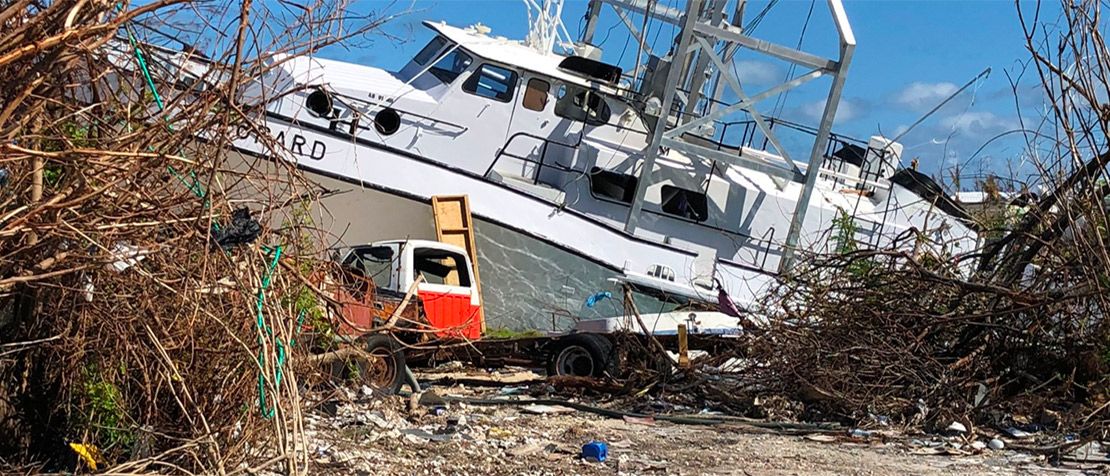
Desolation Hurricane Dorian and the importance of emergency communication drills
Visiting the Bahamas in the weeks after Hurricane Dorian tore through the island nation, nothing could have prepared me for what I saw.
I had closely followed events on the news, but seeing the destruction ‘up close and personal’ was profoundly horrifying.
Debris of all shapes and sizes littered the once beautiful and pristine beaches of Abaco and Grand Bahama.
Collapsed buildings, others with roofs blown off, uprooted trees, telecommunication masts reduced to pieces of twisted metal, fishing and luxury boats that once adorned the ports wrecked and crushed…the destructive power of a storm like Hurricane Dorian is simply unimaginable.
Standing amidst the debris and what remains of one of the most beautiful places in the Caribbean, I recalled the words of UN Secretary General Antonio Guterres, who so aptly described Dorian as a “Category Hell” disaster.
Through all this chaos, the courage of the locals was quite simply extraordinary.
Wherever I went, I heard the same uncompromising message: the impact of Hurricane Dorian will be felt for a long time, but it did not destroy the spirit of the Bahamian people.

Although the Bahamas was well prepared, Dorian was slow moving; even excellent preparations simply could not withstand the relentless pounding from a Category 5 hurricane moving at just one mile per hour.
Communication networks in Abaco and Grand Bahama quickly fell, and government agencies were rendered unreachable.
RELATED: Why ITU is joining the Crisis Connectivity Charter: Doreen Bogdan-Martin
One of the local mobile operators succeeded in partially restoring services within a couple days, but unfortunately many in Abaco and Grand Bahama had lost everything in the storm – including their mobile phones.
Heroically, the company took the drastic action of distributing hundreds of mobiles to local people, so that those affected could reach out to loved ones or call for help, and so that government agencies could rapidly launch search and rescue operations and begin the distribution of humanitarian aid.
For our part, ITU worked with the Emergency Telecommunications Cluster to rapidly dispatch critical communications equipment, including Iridium and Inmarsat satellite phones and terminals.
During my visit I was delighted to learn that this equipment is now being used by the National Emergency Management Agency to coordinate communication between government agencies.
While on the ground, I also met with representatives of various agencies, including the Utilities Regulation & Competition Authority and the National Emergency Management Agency, along with local operators and the National Chamber of Commerce.
Together, we had very fruitful discussions on lessons learned and practical steps that need to be taken to mitigate the impact of any future disaster.
ITU’s Telecommunication Development Bureau is right now in the process of finalizing global guidelines that will help our Members develop effective National Emergency Telecommunication Plans based on their own national and local requirements.
One key point that emerged from these discussions is the vital importance of conducting emergency drills and exercises long before the start of the hurricane season.
Such drills are a crucial part of preparedness, but are all too often overlooked.
Yet, without a way to test and refine the emergency telecommunications plans and programmes that we all work so hard to put in place, how do we truly know if they are fit for purpose? How can we be sure that our networks, our communications capacity, our personnel, and our means of enabling the restoration of telecommunications links will be up to the task when a disaster strikes?
The Bahamas is yet to finalize its National Emergency Telecommunication plan, and I assured my counterparts and colleagues that, in this respect, ITU can offer concrete practical assistance.
ITU’s Telecommunication Development Bureau is right now in the process of finalizing global guidelines that will help our Members develop effective National Emergency Telecommunication Plans based on their own national and local requirements.
RELATED: Contest winners begin emergency telecommunications training in Washington
We are also working to have the Bahamas to ratify the Tampere Convention, which facilitates the swift approval and deployment of emergency telecommunication equipment.
In addition, we are collaborating with the United States Telecommunications Training Institute (USTTI) to train telecom operators and government and regulatory officials on disaster preparedness and response.
My BDT colleagues and I are looking forward to continuing to work with the Bahamas and other vulnerable nations on emergency communications issues, to reinforce disaster preparedness and help mitigate the catastrophic impact of future extreme weather events.
